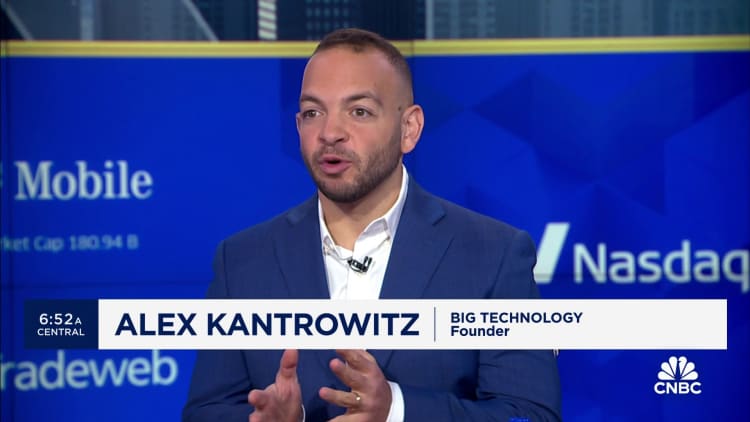
Luis Alvarez | Digitalvision | Getty Images
Nvidia CEO Jensen Huang said at the World Government Summit in Dubai earlier this year, “It is our job to create computing technology such that nobody has to program.”
So far in the artificial intelligence hype cycle, software engineers are still operating at full force, with demand for skilled engineers expected to grow by 25% in the decade ending in 2032, according to the U.S. Bureau of Labor Statistics. But is the hyper-growth of AI as an engineering solution throwing a wrench in that expectation?
“Generative AI will act as an accelerant of changes that we already see in the developer function,” said Don Schuerman, chief technology officer of low-code software company Pega.
Moving forward, Schuerman said syntactic knowledge of how to write code is no longer the most important skill. “The skill that becomes really valuable is the ability to understand business needs,” he said. “That ability to actually listen and understand what a non-technical person is trying to achieve with software and help them translate it.”
This is a form of computational thinking, or computer-like thinking — one skill that will remain prevalent amid AI-enabled software engineering, Schuerman said. While AI coders have proven themselves to out-code many humans in competitive settings — Microsoft GitHub’s Copilot AI will be able to write up to 80% of the code for programmers within five years, and Google DeepMind’s AlphaCode is another example — coding is just one task, and one that may not even be a primary part of the day-to-day roles of the engineer of the future.
“It’s engineering end-to-end solutions,” said Winston Tang, founder of online programming education platform LeetCode. “Coding is just one small part of that solution.”
Talented engineers, Tang said, have a higher level of problem-solving, logic and reasoning skills.
“If people are smart, hungry, they can learn a lot of things with AI,” he said. Even LeetCode, built in 2015 as a solution for Tang himself to prepare for software development job interviews, has leveraged AI for its own internal operations, including testing problem recommendations and having a full-time AI companion helping staff developers solve problems.
David Hsu, CEO and founder of app development platform Retool, believes AI in the software context is a propelling factor. “New technology means more demand. More demand means more software,” Hsu said.
A risk for entry-level engineers
Last year, Retool launched its inaugural State of AI report surveying more than 1,500 technology professionals, which it’s following up with the second edition this summer. Results aren’t published yet, but Hsu said this year it found that the majority of respondents are already using AI almost every day. “It’s clear engineers are already upskilling and building faster with the tools available to them,” he said, adding that now it’s up to business to realize the opportunity and keep pace.
Entry-level engineers may still be at risk, Retool’s research finds, which could create a gap in industry accessibility until education and hiring standards catch up.
That hiring, said Pega’s Schuerman, will inevitably change to compensate for the shift in the prioritization of certain skills for the developer function. “I’m not checking your code,” Schuerman said, imagining the interview of the future. “I’m checking your ability to understand the problem and to problem solve and talk through this solution.”
That reality may feel less grounded than the more tangible technical skills of the moment, but the consensus among experts is that these big-picture skills will become paramount. While “artisanal software developers,” as Schuerman calls them, who live and breathe code will still have a place in the high-end enterprise space, the vast majority of industry professionals will do the work of tailoring already built solutions that solve company-specific problems.
“We’ll see more developers operating more efficiently, opening up entirely new gains in productivity and efficiency, tackling problems that were previously just not possible to address with software,” Hsu said.
Schuerman refers to enterprise architecture as a future-specific need in the engineering space. “In this AI-enabled world, where all of a sudden, anybody can generate an app, how do you actually put it in the architecture so then as an enterprise, all of those pieces actually fit and work together?” he asked. To do so without data compliance or security issues, or with bad employee or customer experiences, will remain a challenge for the broader software engineering community.
Cognition, an applied AI lab building end-to-end software agents, says on its website that it’s enabling “engineers to focus on more interesting problems and empower engineering teams to strive for more ambitious goals.” Its AI agent, dubbed Devin, can successfully resolve nearly 14% of issuesaccording to the SWE bench (an automated benchmark testing systems’ ability to resolve GitHub issues). This is a major increase in previous resolution bests, which fell below the 2% mark.
Despite the general consensus of software engineering remaining a critical role, even the most bullish experts agree that the job’s primary function is evolving.
“Increasingly the software that we use is going to have much more mass production. And that mass production is going to come from AI,” Schuerman said.
The new Retool annual study finds that many respondents cite upskilling and leveraging AI as a tool that helps increase productivity, efficiency and even job satisfaction. “We saw a sense of optimism that jobs will be fundamentally improved,” Hsu said.
